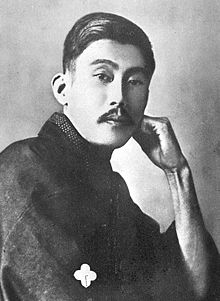- Ozaki Kōyō
-
Ozaki Kōyō (jap. 尾崎 紅葉, wirklicher Name: Ozaki Tokutarō (尾崎 徳太郎); * 10. Januar 1868 in Shiba, Edo (heute: Minato, Tokio); † 30. Oktober 1903) war ein japanischer Schriftsteller.
Ozaki gründete 1885 die literarische Gesellschaft Ken’yūsha. Ab 1889 schrieb er für die Zeitschrift Yomiuri Shimbun, wo mehrere seiner Werke erstmals erschienen.[1] Er veröffentlichte 1895 die Erzählung Aobudō und 1898 der Roman Tajō Takon, bei denen er als einer der ersten für diese Genre statt im klassischem Japanisch im standardsprachlichen de-aru-Stil schrieb.[2] Von 1897 an arbeitete er an dem Roman Konjiki yasha, den er unvollendet hinterließ und der später mehrfach die Vorlage zu Theaterstücken, Filmen und Liedern bildete.[1]
Einzelnachweise
- ↑ a b Roman Adrian Cybriwsky: Historical Dictionary of Tokyo. 2. Auflage. Scarecrow Press, 2011, ISBN 978-0-8108-7238-7, S. 175 (Eingeschränkte Vorschau in der Google Buchsuche).
- ↑ Peter F. Kornicki: Meiji Japan. Political, Economic and Social History 1868-1912. Routledge, New York 1998, ISBN 0-415-15618-1, S. 276 (Eingeschränkte Vorschau in der Google Buchsuche).

Japanischer Name: Wie in Japan üblich, steht in diesem Artikel der Familienname vor dem Vornamen. Somit ist Ozaki der Familienname, Kōyō der Vorname.
Wikimedia Foundation.

